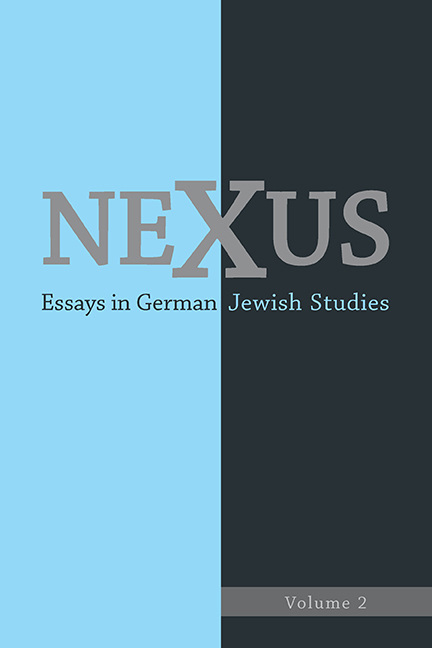Book contents
- Frontmatter
- Dedication
- Contents
- Acknowledgments
- Introduction
- Nexus Forum
- Introduction to the Nexus Forum A Most Unwanted Man: Hans-Joachim Schoeps
- Jew, Prussian, German: The Adventuresome Story of Hans-Joachim Schoeps
- Hans-Joachim Schoeps: Contrarian Scholar
- The Meyerowitz Family from Königsberg: Contemporaries of Hans-Joachim Schoeps
- From the Margins: A Response to Schoeps on Schoeps
- A Conservative Christian Welcome: A Response to Julius Schoeps
- Facing His Nazi Past? A Response to Schoeps on Schoeps
- Setting the Record Straight Regarding The Protocols of the Elders of Zion: A Fool's Errand?
- A Discussion of the “German” Dimension of Reform Judaism in Select Congregations in Three American Southern States, 1860–1880
- Weimar on Broadway: Fritz Kortner and Dorothy Thompson's Refugee Play Another Sun
- If I forget thee, O Jerusalem: The Jewish Exilic Mind in Else Lasker-Schüler's IchundIch
- “Seit ein Gespräch wir sind und hören können von einander”: Martin Buber's Message to Postwar Germany
- Hungerkünstler: George Tabori Directs Kafka in Bremen (1977)
Hans-Joachim Schoeps: Contrarian Scholar
from Nexus Forum
Published online by Cambridge University Press: 15 March 2018
- Frontmatter
- Dedication
- Contents
- Acknowledgments
- Introduction
- Nexus Forum
- Introduction to the Nexus Forum A Most Unwanted Man: Hans-Joachim Schoeps
- Jew, Prussian, German: The Adventuresome Story of Hans-Joachim Schoeps
- Hans-Joachim Schoeps: Contrarian Scholar
- The Meyerowitz Family from Königsberg: Contemporaries of Hans-Joachim Schoeps
- From the Margins: A Response to Schoeps on Schoeps
- A Conservative Christian Welcome: A Response to Julius Schoeps
- Facing His Nazi Past? A Response to Schoeps on Schoeps
- Setting the Record Straight Regarding The Protocols of the Elders of Zion: A Fool's Errand?
- A Discussion of the “German” Dimension of Reform Judaism in Select Congregations in Three American Southern States, 1860–1880
- Weimar on Broadway: Fritz Kortner and Dorothy Thompson's Refugee Play Another Sun
- If I forget thee, O Jerusalem: The Jewish Exilic Mind in Else Lasker-Schüler's IchundIch
- “Seit ein Gespräch wir sind und hören können von einander”: Martin Buber's Message to Postwar Germany
- Hungerkünstler: George Tabori Directs Kafka in Bremen (1977)
Summary
MY ENCOUNTER WITH HANS-JOACHIM SCHOEPS occurred in my first semester at the University of Erlangen. I had enrolled in the School of Law with the intention of joining the newly re-established German diplomatic service upon graduation. I anticipated that within a few years I would represent the Federal Republic of Germany as ambassador in Moscow, London, or Washington. In short, I was full of myself and thought big. I had registered for a full load of courses but by serendipity I happened to see the announcement of a course in the Arts and Sciences. It was offered by Professor Hans-Joachim Schoeps and was titled “The Great Founders of Religions and their Teachings.” That seemed an interesting course, and I enrolled. The brilliance of the lectures and the excitement of the subject matter made me decide I wanted to enroll in another course by Schoeps. Two semesters later I had relinquished law school and the dream of diplomatic service—with no tears on either side—and had turned to the study of Religion, Theology, and History.
Eventually Schoeps supervised my doctoral dissertation on an aspect of the Protestant Reformation of the sixteenth century, though, let me quickly add, “supervised my dissertation” might not quite be the right description: when I formally submitted my work, with which I intended to revolutionize Reformation scholarship, he had not seen a single page, always assuring me that I was so much more familiar with the subject matter and the sources than he. Now that I had completed the project he decided that my topic was conceptually erroneous. Heaven only knows what course my professional life would have taken had I accepted Schoeps's pronouncement as a manifestation of professorial infallibility. I decided to argue with him about the matter. He allowed himself to be persuaded, which says something about him, both as an individual and a scholar. My judgment at the time that Hans-Joachim Schoeps was the most brilliant person I had encountered all these years has not changed as time has passed. More than anything or anybody else, he has influenced my teaching and scholarship.
Schoeps's professorship at the University of Erlangen was labeled “History of Religion and Ideas.” It was a unique and at the same time rather pretentious designation, which potentially subsumed everything and everybody in the human past.
- Type
- Chapter
- Information
- NexusEssays in German Jewish Studies, pp. 21 - 28Publisher: Boydell & BrewerPrint publication year: 2013



